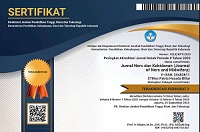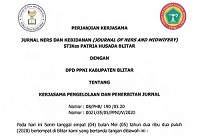Lecturing Method and Video Learning Media Effectively Increases Knowledge and Motivation on Health Education
DOI:
https://doi.org/10.26699/jnk.v9i3.ART.p288-295Keywords:
health education, lecturing method, video learning media, knowledge, motivationAbstract
The selection of health education media should be based on target tastes, broad impact, and presented in an attractive manner. Health Education on Breast Self-Examination (BSE) is generally still carried out using the conventional method, namely face-to-face (FF). This study aimed to determine the effect of health education on BSE using the Lecture Plus Animation Video Demonstration (VBL) on the knowledge and motivation of Vocational High School students. There were 80 respondents who were divided into 2 groups, 40 students in the control group with health education provided with direct FF, and the rest with VBL. The level of knowledge and motivation were obtained through a questionnaire and then the Wilcoxon signed-rank test was conducted to determine the effect of the intervention on each group, while Mann-Whitney to find out which group had better knowledge and motivation after receiving the intervention. The results showed that the Wilcoxon test in both the control and treatment groups showed p = 0.000 for the knowledge and motivation variables. Meanwhile, the Mann-Whitney test for the knowledge variable showed a p-value = 0.004 with a mean rank of 36.00 for the control group and 45.00 for the treatment group. In the motivational variable, the value of p = 0.003, and the mean rank of 46.13 in the treatment group. This meant that health education with FF methods or through VBL could increase students' knowledge and motivation, but VBL had a greater influence on increasing respondents' knowledge and motivation in doing BSE.
References
Anand, J. (2020). Pengaruh Minat Belajar Terhadap Hasil Belajar Siswa (Survey pada mata pelajaran Produk Kreatif dan Kewirausahaan Kelas XII Tata Boga di SMKN 15 Bandung). Universitas Pasundan.
Darmawan, D., & Zulfa, S. (2015). Pengaruh Promosi Kesehatan Terhadap Motivasi Pasien Hipertensi Tentang Pelaksanaan Diet Hipertensi Di Poliklinik Penyakit Dalam RS Rajawali Bandung. Jurnal Pendidikan Keperawatan Indonesia, 1(1). https://doi.org/https://doi.org/10.17509/jpki.v1i1.1187
Dewanti. (2012). Hubungan Tingkat Pengetahuan Tentang Kesehatan Gigi Dengan Perilaku Perawatan Gigi Pada Anak Usia Sekolah Di SDN Pondok Cina 4 Depok. Universitas Indonesia.
Elvinaro, A., Komala, L., & Siti, K. (2014). Komunikasi Massa : Suatu Pengantar (Revisi Cet). Simbiosa Rekatama Media.
Irfaniah, R. (2015). Pengaruh Penyuluhan Kesehatan Tentang Pemeriksaan Payudara Sendiri (Sadari) Terhadap Tingkat Pengetahuan SADARI Di SMP Islam Haruniyah Kota Pontianak. Pro Ners, 3(1). https://doi.org/http://dx.doi.org/10.26418/jpn.v3i1.21323
Kasih, L. C. (2016). Efektifitas Peer Education Pada Pengetahuan Dan Sikap Siswa Sma Dalam Pencegahan HIV/AIDS. Jurnal Ilmu Keperawatan, 4(2).
Komala, L., Novianti, E., & Subekti, P. (2014). Strategi Pemilihan Media Promosi Kesehatan Dalam Penanggulangan HIV/AIDS Di Kabupaten Garut. Acta DiurnA, 10(2).
Martin, A. J. (2001). The Student Motivation Scale: A Tool for Measuring and Enhancing Motivation. Australian Journal of Guidance and Counselling, 11(1). https://doi.org/10.1017/S1037291100004301
Martin, A. J. (2003). The Student Motivation Scale: Further testing of an instrument that measures school students’ motivation. Australian Journal of Education, 47(1), 88–106. https://doi.org/10.1177/000494410304700107
Myungsun, Y., & Young, P. E. (2012). No Title. Journal of Advanced Nursing, 68(5), 1100–1110. https://doi.org/10.1111/j.1365-2648.2011.05815.x
Notoatmodjo, S. (2010). Pendidikan dan perilaku kesehatan. Rineka Cipta.
Notoatmodjo, S. (2012). Promosi Kesehatan dan Perilaku Kesehatan. Rineka Cipta.
Novasari, D. H., Nugroho, D., & Winarni, S. (2016). Hubungan Pengetahuan, Sikap, dan Paparan Media Informasi dengan Praktik Pemeriksaan Payudara Sendiri (SADARI) pada Santriwati Pondok Pesantren Al Ishlah Tembalang Semarang Tahun 2016. Jurnal Kesehatan Masyarakat FKM UNDIP, 4(4).
Pieters, H. Z., Jariwarti, B., & Martih, S. (2011). Pengantar Psikopatologi Untuk Keperawatan (1st ed.). Kencana.
Sari, E. K., Rachmawati, P. D., & Ulfiana, E. (2012). Pengaruh Pendidikan Kesehatan Gosok Gigi dengan Metode Permainan Simulasi Ular Tangga terhadap Perubahan Pengetahuan, Sikap, dan Aplikasi Tindakan Gosok Gigi Anak Usia Sekolah di SD Wilayah Paron Ngawi. Indonesian Journal of Community Health Nursing, 1(1). https://doi.org/10.20473/ijchn.v1i1.11902
Savabi-Esfahani, M., Taleghani, F., Noroozi, M., & Tabatabaeian, M. (2017). Role Playing for Improving Women ’ s Knowledge of Breast Cancer Screening and Performance of Breast Self-Examination. Asian Pacific Journal Cancer Prevention, 18(9), 2501–2505. https://doi.org/10.22034/APJCP.2017.18.9.2501
Soetjiningsih. (2010). Tumbuh Kembang Remaja dan Permasalahannya. Sagung Seto.
Sugiyanti, D., Widyawati, S. A., & Tarmali, A. (2013). Beberapa Faktor Yang Berhubungan Dengan Perilaku Pemeriksaan Payudara Sendiri (Sadari) Pada Wanita Di Desa Tambak Agung Kecamatan Kaliori Kabupaten Rembang. STIKes Ngudi Waluyo.
Suparyanto. (2011). Uji Statistik Non Parametris. http://dr-suparyanto.blogspot.com/2011/09/uji-statistik-non-parametris.html
Yusuf, S. (2011). Psikologi Perkembangan Anak dan Remaja. PT. Remaja Rosdakarya.






